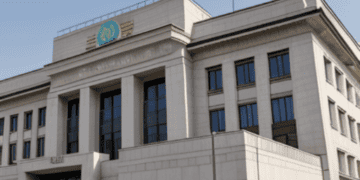In an unexpected move, the Central Bank of Turkey has raised its interest rate to 25 percent, significantly above the anticipated increase to 20 percent. This 7.5 percentage point rise follows last month’s adjustment from 15 to 17.5 percent, marking a notable shift from the country’s prior monetary policy stance, which favored low interest rates.
The Central Bank’s decision reflects its concern over the persistent rise in inflation. “Recent indicators point to a continued increase in the underlying trend of inflation,” the Bank stated, emphasizing its commitment to “further strengthen monetary tightening as much as needed” until there is a substantial improvement in the inflation outlook.
Following the announcement, the Turkish lira strengthened by 1.5 percent against the dollar, indicating market approval of the Bank’s intensified efforts to combat inflation and stabilize the currency.
Analysts have reacted positively to this development. Liam Peach from Capital Economics remarked that the rate increase was significantly larger than expected, demonstrating the Central Bank’s dedication to restoring orthodox policy measures.
The rate hike comes in the wake of Turkey’s economic turmoil, exacerbated by an inflation rate that peaked at 85 percent annually last October and is again on the rise. The economic strategy shift follows President Recep Tayyip Erdogan’s election victory in May, after which he appointed market-friendly officials to his government. These new appointees, including Hafize Gaye Erkan, the former Wall Street executive now chairing the Central Bank, have been instrumental in steering Turkey towards a more conventional economic approach.
This transition has included letting the lira devalue against the dollar to alleviate pressure on state finances and implementing technical measures to rebalance the economy and regain investor confidence.
Despite initial resistance from Erdogan, who has historically viewed high-interest rates as inflationary rather than a solution, the new economic team’s strategy indicates a significant departure from his long-held beliefs. The Central Bank’s current stance under Erkan’s leadership marks a definitive move towards more traditional economic policies.
However, challenges remain, with the annual inflation rate expected to peak at around 60 percent between April and June of the following year. Analysts like ING’s Muhammet Mercan highlight the persistent gap between the policy rate and current inflation expectations, suggesting ongoing economic pressures.
The latest increase in interest rates signals a new era in Turkish economic policy, one that aligns more closely with conventional economic principles and aims to stabilize the nation’s currency and inflation rate.
Your go-to for supply chain report news updates: The Supply Chain Report. For international trade tools, see ADAMftd.com.
#CentralBankofTurkey #InterestRateHike #TurkeyEconomy #LiraStrengthens #MonetaryPolicyShift #InflationControl #ErdoganEconomicShift #HafizeGayeErkan #CapitalEconomics #TurkeyInterestRate #MarketResponse #InflationOutlook #TurkishCurrency #EconomicReforms #InterestRateRise #ConventionalEconomicPolicy

















